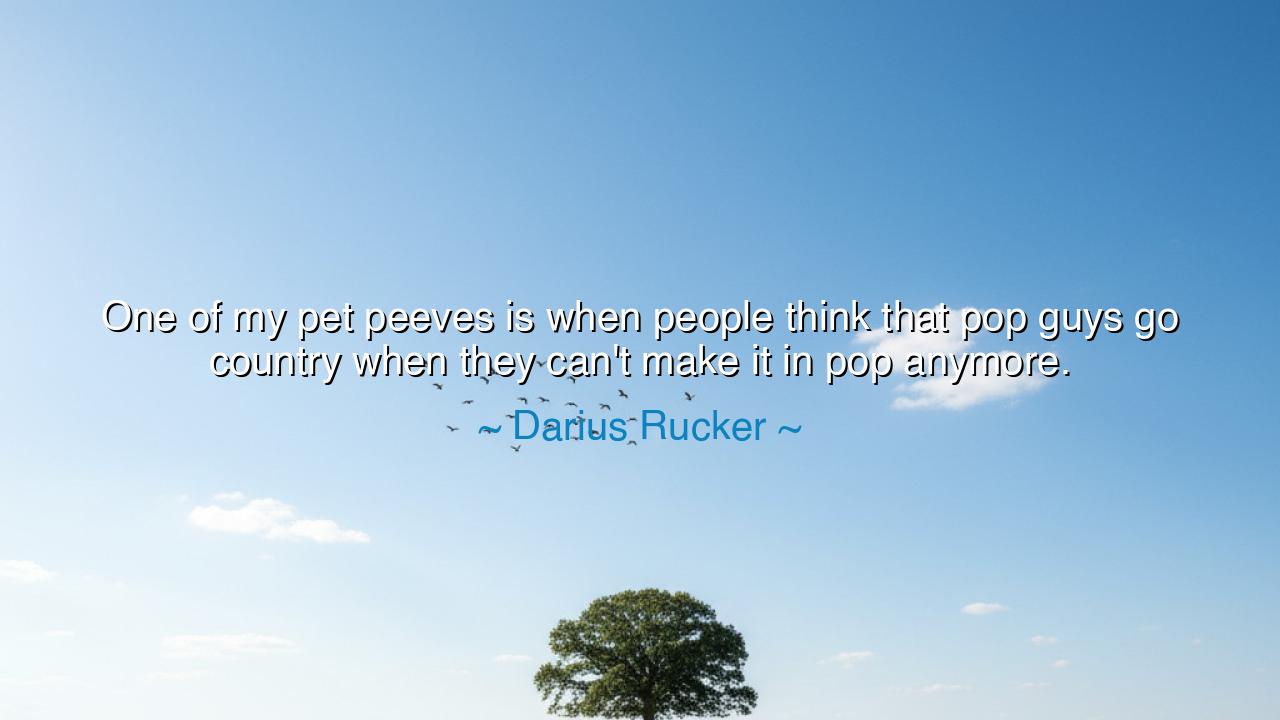
One of my pet peeves is when people think that pop guys go
One of my pet peeves is when people think that pop guys go country when they can't make it in pop anymore.






In the words of Darius Rucker: “One of my pet peeves is when people think that pop guys go country when they can't make it in pop anymore.” At first, this may sound like a defense of genre or reputation, yet at its core it is a statement about authenticity, respect, and misunderstanding. Rucker, who once soared in the world of pop and rock, speaks here not only of his own journey into country music, but of the deeper insult hidden in the assumption—that one’s art is not born of love, but of failure.
The origin of these words rests in the long history of music itself, where borders between styles have been guarded as though they were kingdoms. To say that a pop artist moves into country only because he has “failed” is to deny the calling of the heart. Country music, with its roots in soil, struggle, and storytelling, is not a refuge for the fallen but a discipline that demands sincerity. Rucker’s frustration reveals the ancient truth: a true artist does not choose a genre out of convenience, but because something within that form speaks the language of his soul.
We can see this reflected in history. Consider Paul Simon, who turned to South African rhythms and sounds in Graceland. Many dismissed it at first as a desperate experiment, but in time it was recognized as a work of profound artistry that reshaped the understanding of popular music. Or Ray Charles, who brought the power of gospel into country, earning both resistance and reverence, but in the end proving that his heart for music transcended boundaries. Their journeys, like Rucker’s, remind us that genre is not a prison but a bridge, and the artist’s task is to follow truth wherever it leads.
The assumption Rucker critiques—that artists change styles only out of failure—is born from the narrowness of human judgment. Too often we believe that people move because they cannot stand, that they change because they are weak. Yet the opposite is often true. To cross into a new art, a new field, or even a new life is an act of courage. It means beginning again, humbling oneself before different traditions, and risking rejection. To dismiss such bravery as desperation is to misunderstand the essence of creativity itself.
The deeper meaning of Rucker’s words is that authentic work should never be judged by the assumptions of others. The one who sings from the heart sings truly, whether his voice rises over country strings or pop beats. The one who writes with honesty writes rightly, whether in verse or prose. And the one who lives with integrity lives nobly, whether his road follows one tradition or another. The world may whisper that change is weakness, but the wise know that change, when born of truth, is strength.
The lesson for us is this: do not let others define the meaning of your path. If your heart pulls you from one craft to another, from one field to another, from one chapter of life into the next, do not be ashamed. Do not let the judgments of others turn your courage into guilt. Instead, honor the authenticity of your own journey, for only you know the song your soul was made to sing.
In practice, this means respecting not only our own choices, but also the choices of others. Do not belittle the one who changes course, who leaves one career for another, who steps from the known into the unknown. Encourage them instead, for they are living bravely. And if you are the one who feels called to such a change, remember Rucker’s words: let no one say you moved because you failed. Say instead, “I moved because this is where my heart belongs.”
Thus, Darius Rucker’s frustration becomes a timeless teaching: authenticity is stronger than assumption, and courage is nobler than conformity. The true artist, the true human being, does not measure his path by what critics say, but by what his soul demands. Follow that path with honesty, and you will find that what others call “failure” is in truth the highest form of freedom.






AAdministratorAdministrator
Welcome, honored guests. Please leave a comment, we will respond soon